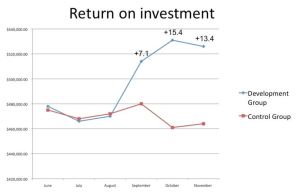There is a lot being said about the future of work, and what this means for the type of skills, attitudes, and behaviours we will require to succeed. With this future already upon us, it is important that we pick up our pace of change, and look to build capability that helps us to adapt, thrive and succeed within an ever changing world. Best selling author, Jacob Morgan, describes in his latest book ‘The Future of Work’ five trends shaping the future of work;
- New behaviours
- Technology
- Millennials
- Mobility
- Globalisation
These trends are bringing a dramatic shift in attitudes and ways of working; new behaviours, approaches, and workplace expectations. Whilst many of us are sensing these rapid changes, we aren’t necessarily sure why these changes are happening, what they mean, or how they will impact us.
As Jacob Morgan says:
“The disruption of every industry is also causing a bit of unrest as people struggle to define where they fit or if they will be obsolete. It’s forcing us to adapt and change to stay relevant while giving rise to new business models, new products, new companies, new behaviours, and new ways of simply existing in today’s world”.
So, the burning questions are: what exactly do these changes look like for employees, managers, and organisations? And, what skills, attitudes, and behaviours do we require to succeed?
What we do know is that modern employees are more self-directed, collaborative in their approach, and want to shape and define their own career paths instead of having them predefined for them. They are continually seeking out learning opportunities that fit with their personal purpose and professional aspirations, and are looking for development opportunities that benefit them holistically as a ‘whole person’. They seek the skills, confidence and healthy mind-set to challenge the status quo, to think on their feet, and to continually adapt within highly fluid and ever changing organisational environments. They are looking to learn and develop emotional and social intelligence; to work within increasingly networked communities; to lead, collaborate, innovate and share.
Consistent with the above is five crucial behaviours, identified by Morgan, as being required by employees in the modern workplace;
- Self-Direction and Autonomy – to continually learn, and stay on top of important tasks within manager-less organisations
- Filter and Focus – to be able to manage the cognitive load associated with increasing amounts of pervasive information
- Embracing Change – to continually adapt to new working practices whilst demonstrating resilience and healthy mind-sets
- Comprehensive Communication Skills – to support collaborative work practices, and to communicate ideas and provide feedback succinctly
- Learning to Learn – to be willing to adopt a pro-learning mind-set; to step outside comfort zones, reflect, and make meaning of experiences.
Organisations also need to adapt to the future of work to support these trends and demands, and ensure they are attracting, developing, and retaining top talent. A good place to start is by fostering and embracing the principles of organisational learning. Peter Senge suggested in his book ‘The Fifth Discipline: The Art of the Learning Organisation’ that in order for an organisation to remain competitive within the complex and volatile business environments that we find ourselves operating they must build their capacity for continually transforming. This involves developing cultures that;
- Encourage and support employees in their pursuit of personal mastery (the discipline of continually clarifying and deepening our personal vision, and seeing reality objectively)
- Encourage employees to challenge ingrained assumptions and mental models
- Foster genuine commitment and enrolment through shared visions.
Here at OPRA we are developing a carefully selected set of best-of-breed, soft skill learning and development programmes to help individuals and organisations embrace these current and future trends. Our programmes are designed to equip professionals with the emotional intelligence, healthy thinking, learning agility, collaborative team behaviours, and motivation required to demonstrate exceptional performance within the modern workplace environment. We have grounded our programmes on the principles of positive psychology, and an understanding that REAL learning and engagement only occurs when self-awareness, participation, and a tangible sense of progress are present. Therefore, and in light of this, all our programmes are designed to;
- Develop self-insight and raise awareness of individual and collective strengths
- Utilise proven research based content, delivered by expert and accredited practitioners
- Provide access to on-going professional coaching opportunities to further deepen learning
- Incorporate social learning methodologies to encourage and enable collaboration and sharing
- Provide applied on-the-job challenges and reflection to embed and sustain behavioural changes.
Watch this space for further announcements about OPRA Develop over the coming months. In the meantime, if you would like to discuss how OPRA can support your learning and development with proven, researched based soft-skill development programmes, then please contact your local OPRA office:
Wellington: 04 499 2884 or Wellington@opragroup.com
Auckland: 09 358 3233 or Auckland@opragroup.com
Christchurch: 03 379 7377 or Christchurch@opragroup.com
Australia: +61 2 4044 0450 or support@beilbyopragroup.co.au
Singapore: +65 3152 5720 or Singapore@opragroup.com
